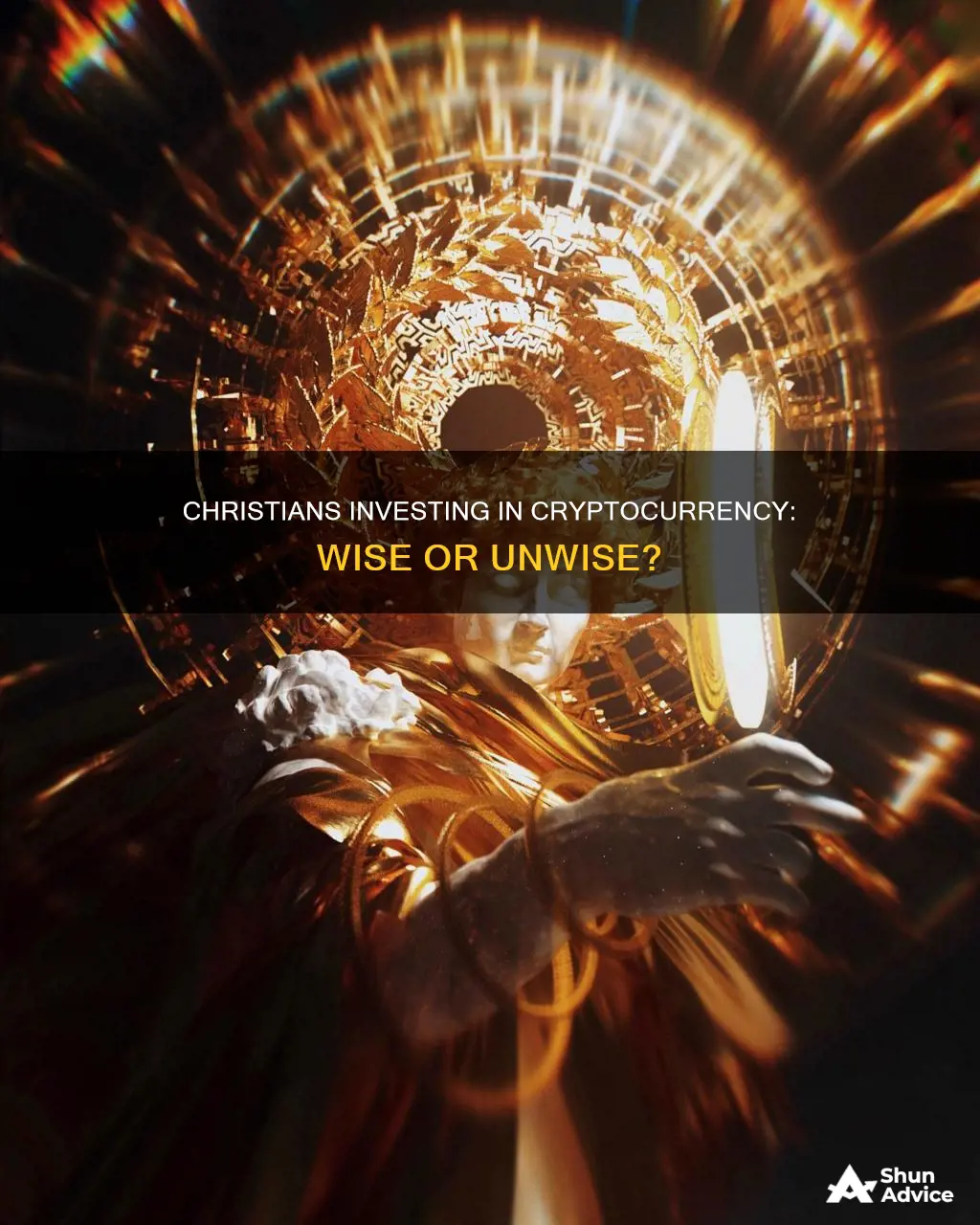
Investing in cryptocurrency is a complex and divisive topic, and this is no different for Christians. With thousands already investing, it is only natural for Christians to wonder if they should get involved. Cryptocurrency is a digital currency that is not backed by any government or bank and is designed to save, buy and sell. It is a complex system that can be difficult to understand, and its value is based on what people are willing to pay for it. This volatility makes it a very risky investment. As a Christian, it is important to remember that God is the most important person in your life and that your happiness, joy, and security are found in Him alone. Cryptocurrency can be a source of unwanted stress and it is within your Christian freedom to choose whether or not to invest, but be aware of the dangers and challenges it may bring.
| Characteristics | Values |
|---|---|
| Definition | "A digital currency in which transactions are verified and records maintained by a decentralized system using cryptography, rather than by a centralized authority." |
| Number of cryptocurrencies | 21,844 as of November 2022 |
| Examples | Bitcoin, Dogecoin, Litecoin, Ethereum, Tether, Solana |
| Volatility | High |
| Risk | High |
| Speculation | High |
| Greed | High |
| Discontentment | High |
| Idolatry | High |
| Faith | Low |
What You'll Learn

Is cryptocurrency a get-rich-quick scheme?
Cryptocurrency is a digital or virtual currency that uses cryptography to secure itself and make it nearly impossible to counterfeit or double-spend. It is not issued by any government or bank, and its value is determined by what people are willing to pay for it.
The very nature of cryptocurrency means that it is unstable and difficult to control, and its value can fluctuate daily due to volatility. This makes it a very risky investment. While some people have made significant gains, many more have lost money. The Federal Trade Commission (FTC) reported that over 46,000 people lost more than $1 billion in cryptocurrency to 'get-rich-quick' schemes.
Get-rich-quick schemes often promise high returns with minimal investment and effort, creating a false sense of urgency and using anecdotal success stories to lure people in. However, they rarely work and often lack a sustainable strategy, with a high risk of financial loss.
The Bible also warns against the pursuit of quick wealth, stating that "wealth gained hastily will dwindle" (Proverbs 13:11) and that "whoever hastens to be rich will not go unpunished" (Proverbs 28:20).
Therefore, while cryptocurrency can be a legitimate form of currency or investment, it is not a reliable get-rich-quick scheme. Those considering investing in cryptocurrency should approach it with caution and a long-term perspective, treating it as one component of a diversified investment portfolio.
Guide to Investing in Dogecoin: Tips and Strategies
You may want to see also

What does the Bible say about crypto?
The Bible does not directly address cryptocurrency, but there are several passages that can guide Christians in their decision-making around this new form of digital currency.
Firstly, the Bible warns against the pursuit of wealth through get-rich-quick schemes or gambling. Proverbs 13:11 states, "Wealth from get-rich-quick schemes quickly disappears", and Proverbs 28:20 cautions that "whoever hastens to be rich will not go unpunished" (ESV). These verses encourage Christians to be cautious about investing in volatile assets like cryptocurrency, which has seen extreme price fluctuations and is often touted as a way to get rich quickly.
The Bible also emphasizes the importance of wise and patient investing. Proverbs 13:11, 12:11, and 12:27 highlight the value of gathering wealth "little by little" and through diligent work rather than rapid accumulation. This aligns with the biblical view of stewardship, where Christians are called to manage their resources responsibly and for the glory of God (Romans 11:36, Colossians 1:16).
Additionally, the Bible warns against idolatry and placing anything above God in our lives (Exodus 20:4). Cryptocurrency, like money, can become an idol if it becomes the most important thing in our lives or a source of assurance. Christians are called to remember that their true security and salvation are found in God alone (John 14:6).
Furthermore, the Bible encourages Christians to use their resources for eternal purposes and the advancement of God's kingdom (Matthew 6:19-20). Instead of speculating on volatile assets, Christians are called to invest in ways that support godly ministries and help those in need (Proverbs 11:24, 13:22).
Lastly, the Bible provides guidance on making ethical investments. While cryptocurrency is decentralized and independent of government control, Christians should consider the broader impact of their investments. Investing in companies or assets that align with biblical values and contribute to society in tangible ways may be a more prudent approach.
In conclusion, while the Bible does not specifically mention cryptocurrency, it does provide principles that can guide Christians in their decision-making around this topic. Caution, wise stewardship, avoiding idolatry, investing for eternal purposes, and considering the ethical impact of investments are key considerations for Christians when approaching the world of cryptocurrency.
Should You Invest in ApeCoin?
You may want to see also

Is crypto gambling?
There is a clear overlap between gambling and investing in cryptocurrency, with some sources even referring to the latter as a form of the former. However, there are also important distinctions between the two.
Firstly, it is worth noting that the line between gambling and investing is not always clear-cut, and that any investment involves a degree of risk or speculation. That said, there are several key differences between investing and gambling.
One important distinction is that gambling typically involves placing bets on uncertain outcomes that are predominantly influenced by chance. In contrast, investing in stocks or other assets involves owning a stake in a company or asset, which can generate value over time through growth, dividends, or other means.
Another difference is that gambling often involves a zero-sum game where one person's gain comes at the expense of another player's loss. In contrast, investing in stocks or other assets can create value for multiple parties, such as helping a company grow or supporting the development of new products or services.
Additionally, gambling is generally considered a high-risk activity with the odds stacked against the gambler over time. In contrast, investing in a diversified portfolio of stocks or other assets can be a safer way to grow one's wealth over the long term, as the economy tends to grow and become more productive.
When it comes to cryptocurrency, the argument that it is a form of gambling stems from the fact that it involves investing in highly volatile assets with limited information and the expectation of uncertain but potentially high gains. This is similar to placing bets on uncertain outcomes, and the high volatility of cryptocurrency prices can lead to significant gains or losses for investors.
However, it is important to note that cryptocurrency is not just a speculative asset but also a medium of exchange and a store of value for many people. Cryptocurrencies like Bitcoin are often compared to digital gold due to their limited supply and resistance to inflation. Additionally, the decentralised nature of cryptocurrencies means that they are not controlled by any central authority, which can be appealing to those seeking greater financial privacy and independence.
In conclusion, while there are certainly similarities between gambling and investing in cryptocurrency, there are also important distinctions to be made. Ultimately, the decision to invest in cryptocurrency or not depends on a variety of factors, including one's financial goals, risk tolerance, and personal values.
Altcoin Investment Strategies: A Beginner's Guide to Crypto Profits
You may want to see also

Is crypto idolatry?
Crypto-idolatry is a term used to describe the perceived worship of cryptocurrency, particularly Bitcoin, in place of a religious deity. Bitcoin is a digital monetary system that exists as entries in an electronic database called a blockchain. It is not backed by any state or central authority and its value is extremely volatile.
Some people view Bitcoin as a moral imperative, likening its emergence to the Reformation. They see it as a way to protect their labour from being devalued by central banks and the state. However, critics argue that Bitcoin is simply a new form of idolatry, where people are inspired to sacrifice their real wealth and goods in the hope of receiving abstract, intangible goods in return.
The Bible warns against the idolatry of money and the worship of golden idols. Cryptocurrency has been criticised for encouraging an obsession with wealth and consumption, leading to a fixation on wealth that blinds people to the poverty around them. The energy-intensive process of "mining" Bitcoin also contributes to environmental damage.
Bitcoin has been described as a "pseudo-religious movement" that goes after people's souls. The Bitcoin movement is loaded with religious language and metaphysical conjecture, with rituals such as "Bitcoin Baptisms" and "Satoshi Services" on Sundays.
Overall, the perception of crypto-idolatry stems from the belief that cryptocurrency, particularly Bitcoin, has become an object of worship and obsession, leading to negative social and environmental consequences.
A Beginner's Guide: Investing in Bitcoin in Qatar
You may want to see also

Is crypto a good investment?
Investing in cryptocurrency is a highly speculative endeavour. As such, it is a risky investment and not a good way to build wealth for the future. The price of cryptocurrencies is extremely volatile, and investors can make or lose money very quickly. For example, in the summer of 2020, one Bitcoin was worth around $10,000. By the spring of 2021, its value had skyrocketed to $60,000, but as of January 2023, it was worth $17,463—a loss of over 70% in less than two years.
Cryptocurrency is a digital currency that is not backed by any government or bank. Its value is based solely on what people are willing to pay for it, and it is run on decentralised networks based on blockchain technology. This lack of government involvement makes the price of cryptocurrencies highly volatile and therefore risky.
Some Christians may be tempted to invest in cryptocurrency as a way to resist government control over their finances. However, investing in cryptocurrency is not the same as investing in traditional assets such as stocks or real estate. Cryptocurrency does not produce anything tangible and is not backed by the reputation and resources of any government or country. Therefore, investing in cryptocurrency is more like gambling than responsible stewardship.
The Bible warns against the dangers of getting rich quick and the folly of putting money into something without understanding it. Proverbs 13:11 states, "Wealth gained hastily will dwindle, but whoever gathers little by little will increase it." This indicates that investing in something volatile and speculative, like cryptocurrency, is not wise.
Additionally, the Bible warns against idolatry, and anything can be turned into an idol in the present day. Cryptocurrency has a higher chance of becoming an idol in people's lives as it can quickly become intoxicating and obsessive. As such, Christians should be aware of their limits and remember that their happiness, joy, and security are found in the Lord alone.
In conclusion, while Christians have the freedom to choose whether or not to invest in cryptocurrency, it is not a good investment due to its high risk and speculative nature. Christians should also be cautious about the potential for cryptocurrency to become an idol and remember that their true treasure is found in God.
Dubai's Crypto Investment Guide: Getting Started
You may want to see also







